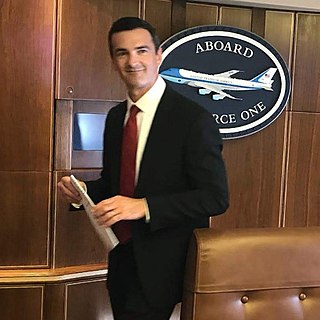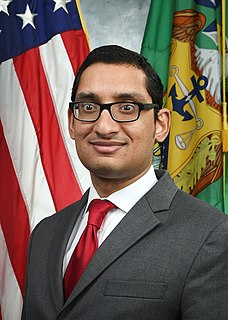
The United States secretary of the treasury is the head of the United States Department of the Treasury, which is concerned with all financial and monetary matters relating to the federal government, and, until 2003, also included several major federal law enforcement agencies. The secretary of the treasury is the principal economic advisor to the president of the United States and plays a critical role in policy-making by bringing an economic and government financial policy perspective to issues facing the federal government. The secretary of the treasury is a member of the United States Cabinet, and is nominated by the president of the United States. Nominees for Secretary of the Treasury undergo a confirmation hearing before the United States Senate Committee on Finance, prior to a vote by the United States Senate.

The Executive Office of the President (EOP) comprises the offices and agencies that support the work of the president at the center of the executive branch of the United States federal government. The EOP consists of several offices and agencies, such as the White House Office, the National Security Council, and the Office of Management and Budget.

The Department of the Treasury (USDT) is the national treasury of the federal government of the United States where it serves as an executive department. The department oversees the Bureau of Engraving and Printing, and the U.S. Mint; these two agencies are responsible for printing all paper currency and coins, while the treasury executes its circulation in the domestic fiscal system. The USDT collects all federal taxes through the Internal Revenue Service; manages U.S. government debt instruments; licenses and supervises banks and thrift institutions; and advises the legislative and executive branches on matters of fiscal policy. The Department is administered by the secretary of the treasury, who is a member of the Cabinet. The treasurer of the United States has limited statutory duties, but advises the Secretary on various matters such as coinage and currency production. Signatures of both officials appear on all Federal Reserve notes.
The Under Secretary of the Treasury for Domestic Finance is a high-ranking position within United States Department of the Treasury that reports to, advises, and assists the Secretary of the Treasury and the Deputy Secretary of the Treasury. The under secretary leads the department's policy on the issues of domestic finance, fiscal policy, fiscal operations, government assets, government liabilities, and other related economic and fiscal matters.
The Under Secretary for Terrorism and Financial Intelligence is a position within the United States Department of the Treasury responsible for directing the Treasury's efforts to cut the lines of financial support for terrorists, fight financial crime, enforce economic sanctions against rogue nations, and combat the financial support of the proliferation of weapons of mass destruction. The Under Secretary is appointed by the President and confirmed by the Senate.

Linda Morrison Combs is a former U.S. federal government official. She was the Controller of the Office of Management and Budget in the Executive Office of the President at the White House. She had five Presidential Appointments confirmed by the United States Senate and served under three Presidents: Presidents Ronald Reagan, George H.W. Bush, and George W. Bush.
Executive Schedule is the system of salaries given to the highest-ranked appointed officials in the executive branch of the U.S. government. The president of the United States appoints individuals to these positions, most with the advice and consent of the United States Senate. They include members of the president's Cabinet, several top-ranking officials of each executive department, the directors of some of the more prominent departmental and independent agencies, and several members of the Executive Office of the President.

A United States Assistant Secretary of the Treasury is one of several positions in the United States Department of the Treasury, serving under the United States Secretary of the Treasury.
The Office of Fiscal Service (OFS) is an agency of the United States federal government in the United States Department of the Treasury. The office is led by the Fiscal Assistant Secretary of the Treasury. The Fiscal Assistant Secretary reports to the United States Secretary of the Treasury through the Under Secretary of the Treasury for Domestic Finance.

Randal Keith Quarles is an American government official, private equity investor and attorney who has served as a member and vice chair for supervision of the Federal Reserve Board of Governors since October 2017. Previously he was founder and head of The Cynosure Group, a private investment firm, and a former partner of The Carlyle Group, one of the world's largest private equity firms. From August 2001 until October 2006, he held several financial policy posts in the George W. Bush administration, ultimately serving as Under Secretary of the Treasury for Domestic Finance.
The Emergency Economic Stabilization Act of 2008, often called the "bank bailout of 2008," was proposed by Treasury Secretary Henry Paulson, passed by the 110th United States Congress, and signed into law by President George W. Bush. The act became law as part of Public Law 110-343 on October 3, 2008, in the midst of the Financial crisis of 2007–2008. The law created the $700 billion Troubled Asset Relief Program (TARP) to purchase toxic assets from banks. The funds for purchase of distressed assets were mostly redirected to inject capital into banks and other financial institutions while the Treasury continued to examine the usefulness of targeted asset purchases.
The Troubled Asset Relief Program (TARP) is a program of the United States government to purchase toxic assets and equity from financial institutions to strengthen its financial sector that was passed by Congress and signed into law by President George Bush. It was a component of the government's measures in 2009 to address the subprime mortgage crisis.

Greg Zerzan is an attorney and former acting assistant secretary of the U.S Treasury under President George W. Bush. He has held several prominent posts in government and is a frequent speaker on markets and public policy matters.

Ronald Allan "Ron" Rosenfeld is an American politician and housing expert. Rosenfeld has previously served in numerous U.S. federal and Oklahoma state government positions relating to housing. He served as chair of the Federal Housing Finance Board and president of the Government National Mortgage Association under president of the United States George W. Bush and as Oklahoma Secretary of Commerce under governor of Oklahoma Frank Keating.
The Assistant Secretary of the Treasury for Financial Institutions is an official in the United States Department of the Treasury who is the head of the Office of Financial Institutions. In June 2017, President Donald Trump nominated Christopher Campbell to the position. He was confirmed by the U.S. Senate on August 3, 2017.
According to statute, the Fiscal Assistant Secretary is appointed by the United States Secretary of the Treasury. The Fiscal Assistant Secretary is the highest ranking career official in the Department of the Treasury. The Fiscal Service, which the Fiscal Assistant Secretary heads, includes the Bureau of Government Financial Operations (which since 1984 has been known as the Financial Management Service and the Bureau of the Public Debt.
Mathew Pendo is an investment banker, having worked for Merrill Lynch and Barclays before taking a position as Chief Investment Officer of the Office of Financial Stability of the United States Treasury in 2011. After several years managing his responsibilities under the Troubled Asset Relief Program and coordinating divestiture of the portfolio, Pendo has returned to the private sector as an investment banker.

Timothy George Massad is an American lawyer and government official who served as the chairman of the Commodity Futures Trading Commission (CFTC) under President Barack Obama. He had previously been Assistant Secretary for Financial Stability at the United States Department of the Treasury, where he oversaw the Troubled Asset Relief Program (TARP) created by the U.S. government in response to the financial crisis of 2007–08.

The Assistant Secretary of the Treasury for Management, Chief Financial Officer, and Chief Performance Officer (ASM/CFO/CPO) is the principal policy advisor to the Secretary and Deputy Secretary on the development and execution of the budget for the Department of the Treasury and the internal management of the Department and its bureaus. The ASM/CFO/CPO also oversees Department-wide management programs including human resources, information and technology management, financial management and accounting, strategic planning, performance budgeting/metrics, acquisition/procurement, training, human capital and workforce management, equal employment opportunity, environmental health and safety, emergency preparedness, small business programs, and administrative services for Treasury's headquarters, the Departmental Offices.

Bimal V. Patel is an American attorney who served as the Assistant Secretary of the Treasury for Financial Institutions and Deputy Assistant Secretary of the Treasury for the Financial Stability Oversight Council. He was one of the “architects” of the emergency $660 billion Paycheck Protection Program in 2020.











